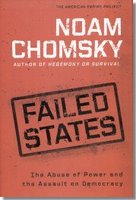Examining the U.S. as a Failed State
 In his new book Failed States, Noam Chomsky, the world's foremost critic of U.S. foreign policy exposes the hollow promises of democracy in U.S. actions abroad -- and at home.
In his new book Failed States, Noam Chomsky, the world's foremost critic of U.S. foreign policy exposes the hollow promises of democracy in U.S. actions abroad -- and at home.
The United States has repeatedly asserted its right to intervene militarily against "failed states" around the globe. In this much-anticipated follow-up to his international bestseller Hegemony or Survival, Noam Chomsky turns the tables, showing how the United States itself shares features with other failed states -- and therefore is increasingly a danger to its own people and the world.
Failed states, Chomsky writes, are those that are unable or unwilling "to protect their citizens from violence and perhaps even destruction" and "regard themselves as beyond the reach of domestic or international law." Though they have have democratic forms, Chomsky notes, failed states suffer from a serious "democratic deficit" that deprives their democratic institutions of real substance. Exploring the latest development in U.S. foreign and domestic policy, Chomsky reveals Washington's plans to further militarize the planet, greatly increasing the risks of nuclear war; assesses the dangerous consequences of the occupation of Iraq, which has fueled global outrage at the United States; documents Washington's self-exemption from international norms. Including the UN Charter and the Geneva Conventions, the foundations of contemporary international law, and examines how the U.S. electoral system is designed to eliminate genuine political alternatives, impeding any meaningful democracy.


